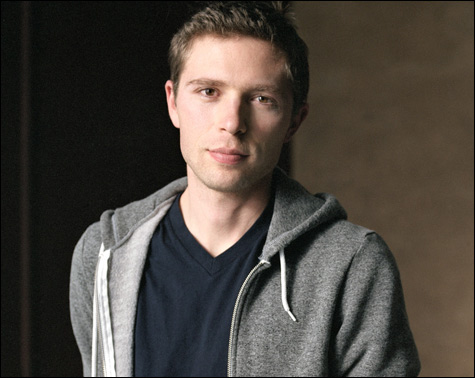Jonah Lehrer on neurological warfare and picking a cereal
By CHRISTOPHER GRAY | April 8, 2009

UNSTUCK BRAIN Jonah Lehrer.
|
Those of us aching for a 300-page treatise about the crippling implications of the "build your own scramble" at Local 188 won't, at first glance, find a great deal of solace in Jonah Lehrer's second book, How We Decide. Like Malcolm Gladwell's new book, Outliers, Lehrer examines our capacity for success and failure through the lens of figures in extraordinary circumstances: a quarterback in the clutch during the Super Bowl, a smokejumper trying to save his hide in a blazing wildfire, a world-famous opera singer who loses her confidence and can no longer sing. If this approach seems somewhat derivative and formulaic, Lehrer's grasp on emerging revelations JONAH LEHRER reads from How We Decide | Houghton Mifflin Harcourt | 302 pages | $25 | at RiverRun Bookstore, 20 Congress St, Portsmouth NH | April 15 @ 7 pm | Free | 603.431.2100 |
in neuroscience affords his book a great utility. Even if we'll never face an onrush of 300-pound linebackers, we still need to know when and whether to trust our first instincts — and when we shouldn't.Lehrer, just 27, is becoming something of a wunderkind in the realm of popular science. A Rhodes Scholar, New Hampshire resident, and editor-at-large at Seed magazine, he's written for the New Yorker and numerous other publications since the release of his 2007 book, Proust Was a Neuroscientist (see "Senses Come Alive," by Christopher Gray, February 15, 2008). That book's thesis (many of history's great artists created prescient work explaining how our brains operated decades or centuries before science could) was compelling, if somewhat anecdotal (Proust was neither a neuroscientist nor an influence on the field). How We Decide has a similar structure to Proust — anecdote, neurological explanation of anecdote, how this new knowledge can inform and benefit our lives — but its intent is more practical, and Lehrer excels at prescribing ways to approach both everyday and exceptional dilemmas without seeming pedantic.
The warring factions in the brain's frontal lobe make it a wonder that we're ever able to make decisions at all. This is the rational area of our brain, unique to humans and (to an extent) primates, where our common sense and emotional urges duke it out. The neurons that transmit the chemical dopamine, supplying wisdom based on experience, have to cooperate with our powerful (and bustling) prefrontal cortex, which regulates our impulses and self-awareness, which is fielding concerns from our amygdala, which is naturally averse to loss, and so on.
Weaknesses or failures of any of these areas can be disastrous. Lehrer says scientists now suspect that schizophrenics suffer from hyperactive dopamine neurons, those with reduced activity in the amygdala cannot empathize with — or even perceive — emotions in others (it's a common trait of serial killers), and as for the prefrontal cortex: it's what's destroyed in a frontal lobotomy. Lehrer uses dramatic examples of these areas in extremes in order to shed light on our mind's activity in more quotidian circumstances. The gambling addict is responding inappropriately to the same rush of dopamine as the shopper compelled to buy a pair of jeans she doesn't need because they're 50 percent off. Despite all this competition and all of the mistakes we make, the brain is miraculously and rather mysteriously able to "supervise itself."
 Related
Related:
So you thought you were special, Photos: Michele McPhee hosts book signing party for A Date With Death, Sarah Braunstein's uncomfortable, beautiful hyperreality, More 
- So you thought you were special
Reading Hannah Holmes's work is enlightening and entertaining — even when it's at its most depressing.
- Photos: Michele McPhee hosts book signing party for A Date With Death
Michele McPhee meets fans and signs copies of her book about the Craigslist killer, A Date With Death , at Jerry Remy's Sports Bar & Grill on January 3, 2011.
- Sarah Braunstein's uncomfortable, beautiful hyperreality
There's an unsettling honesty that spills from Portland author Sarah Braunstein's first novel, The Sweet Relief of Missing Children .
- Interview: The authors of Future Boston on building the Boston of tomorrow
We only have three years before the aliens land. This was the future envisioned in Future Boston , an anthology by a group of local science-fiction writers published in 1995 .
- How to create a readable future
The actual future is a collaboration between nearly seven billion people worldwide. But creating a future can be a fun indoor sport for you and your friends.
- Reaching a new frontier
Shetterly's new memoir, Made for You and Me: Going West, Going Broke, Finding Home is the story of hardships — financial, familial, emotional — not usually the stuff that inspires switching places.
- Wound to precision
The phrase "perfect summer beach read" doesn't make much sense to me. A week at the water is the right moment for me to put down a diverting thriller and indulge in a novel that necessitates those rarest of commodities: unencumbered time and attention.
- Indie rules
Small-press fiction that sings
- State struggles, Gina good!
I don't know the solution to our state's fiscal and political problems. If I did, I'd probably run for public office.
- 28 cent book bin
For some reason, these books have been relegated to the bargain bin.
- Beach reads that don't suck
Lists of beach reads — though as reliable as summer itself — are, generally speaking, a sham.
- Less

 Topics
Topics:
Books
, Science and Technology, Media, Books, More  , Science and Technology, Media, Books, Books, Portsmouth, Life Sciences, Sciences, Book Reviews, Chris Gray, Malcolm Gladwell, Less
, Science and Technology, Media, Books, Books, Portsmouth, Life Sciences, Sciences, Book Reviews, Chris Gray, Malcolm Gladwell, Less 